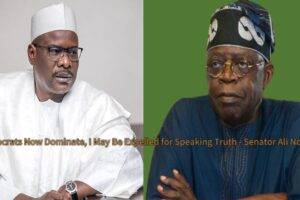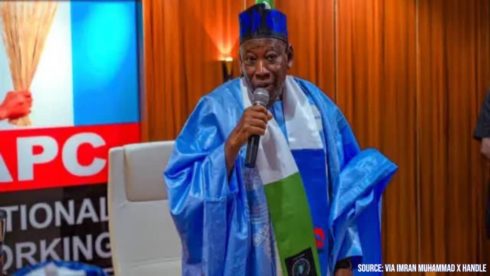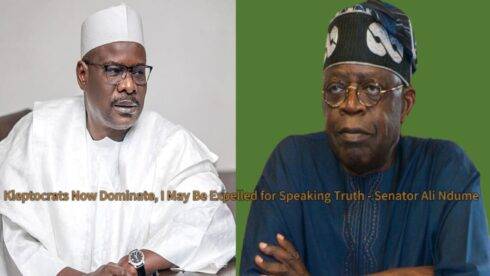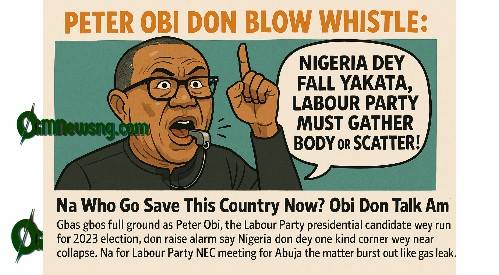Justice Inyang Ekwo of the Federal High Court in Abuja dismissed a lawsuit seeking the removal of Abdullahi Ganduje from his position as the National Chairman of the All Progressives Congress (APC). The case, which has garnered widespread attention, was brought forth by aggrieved members of the party who questioned the legitimacy of Ganduje’s appointment, citing procedural irregularities.
The court, however, found no merit in the plaintiffs’ claims, stating that the process leading to Ganduje’s appointment adhered to the constitutional provisions of the APC. Justice Inyang Ekwo emphasized that the internal matters of political parties are largely beyond judicial interference, as long as due process is followed. His ruling reinforced Ganduje’s leadership position within Nigeria’s ruling party.
Justice Inyang Ekwo: Background of the Lawsuit and Political Context
The lawsuit was initiated by a faction within the APC that opposed Ganduje’s elevation to the position of National Chairman. Abdullahi Ganduje, a former Governor of Kano State, assumed the role in July 2023 following the resignation of the previous chairman. His ascension, however, triggered discontent among some party members who claimed that due process was not followed in his appointment.
The case escalated to the Federal High Court in Abuja, with the plaintiffs arguing that Ganduje’s appointment violated APC’s constitution, which outlines specific protocols for leadership selection. This internal conflict within the APC comes at a time when the party is seeking unity ahead of crucial elections in Nigeria.
Justice Inyang Ekwo: Court’s Rationale for Dismissal
Justice Inyang Ekwo’s dismissal of the case was based on his interpretation of party law and judicial restraint in political matters. He noted that political parties have the autonomy to handle their internal affairs, as long as those processes do not breach fundamental laws. The court ruled that there was no evidence to suggest that Ganduje’s appointment was irregular or unconstitutional.
In addition, Inyang Ekwo reiterated that courts must be cautious in intervening in political disputes that could have been resolved internally within the party. He advised the plaintiffs to work within the party structure to address their grievances rather than resorting to litigation that lacks substantial legal backing.
Ganduje’s Response to the Court Ruling
Following the court’s decision, Abdullahi Ganduje expressed his satisfaction, stating that the ruling reaffirmed the legitimacy of his leadership within the APC. He commended the judiciary for upholding the principles of justice and fairness, noting that the verdict would help stabilize the party ahead of future political contests.
Ganduje also extended an olive branch to aggrieved party members, calling for unity and collaboration within the APC. He emphasized that the ruling should mark a turning point for the party, encouraging members to focus on advancing the APC’s agenda for national development rather than internal conflicts.
Justice Inyang Ekwo: Impact on APC’s Political Strategy
The dismissal of the lawsuit has significant implications for the APC’s political strategy, particularly as the party prepares for upcoming elections. With Ganduje’s leadership now solidified, the party is expected to shift its focus toward consolidating its base and resolving other lingering internal disputes. The court ruling is seen as a victory for the party’s leadership, ensuring continuity in its operations.
Political analysts believe that Ganduje’s firm leadership could strengthen the APC’s position in Nigeria’s complex political landscape. His experience as a two-term governor and his network of influence within the northern region are expected to play a crucial role in shaping the party’s electoral fortunes.
Future Challenges for Ganduje’s Leadership
Despite the court victory, Abdullahi Ganduje faces numerous challenges in steering the APC through a critical period. Internal party divisions, regional power struggles, and the need for broader party reforms remain pressing issues. Some members of the party still harbor reservations about his leadership, particularly those aligned with other political factions within the APC.
Moreover, as Nigeria prepares for elections in 2027, Ganduje’s leadership will be tested by the party’s ability to maintain unity and present a cohesive front to voters. His success in navigating these challenges will determine not only his future as the APC chairman but also the party’s relevance in national politics.
Table of Contents
Discover more from OGM News NG
Subscribe to get the latest posts sent to your email.














